Minutes from ECOV Board Meeting 11-10-12
ECOV Board Meeting – Minutes 11-10-2012
Participating Members of the Board of Directors (constituting a quorum for said meeting to be held): Krpamaya, Madhava Gosh, Navin Shyam, Ranaka, Chaitanya Mangala;
Advisors present: Jaya Krsna, Sukhavaha
1. Approve agenda
Add solar panels at Dhama Seva.
2. Review and approve previous meeting minutes
Project Manager Reports
3. Madhuban prep
The road is in track to be completed before the winter hits. The spring restoration is less critical timewise, and will be taken up in the spring.
4. Trees and berries
More terraces have been made in the G7G
Old business
- 5. Solar panels at Dhama Seva property
Motion: Augment the previously approved solar panel project budget by $6K, to provide for installation of a full system at the Dhama Seva property. ($5K was already remaining in that original allocation.) A condition is that, if the property materially changes its current use and purpose as one of the pilgrimage sites in New Vrindaban, the equipment will revert to ECOV.
Vote: Approved unanimously.
Action steps: The form of this agreement must be determined.
6. Gorsky property
The current price has been confirmed by our real estate attorney as unrealistically high. We will therefore continue on our course of waiting.
END OF MEETING
Yoga Comes to Gopal’s Garden Home School Co-op
Kids love yoga. Even the most energetic child can calm down and relax under the guidance of an expert yoga teacher.
Gaurnatraj prabhu now teaches yoga asanas weekly to the children at New Vrindavan’s Home School Co-op, which remains under the loving care of Mother Ruci, a long-time teacher in New Vrindavan.
At 12 noon on Tuesday mornings, the kids get together, yoga mats under their arms, waiting for Gaurnatraj prabhu to lead them through their Suryanamaskar (Sun Salutation). All the 4 home school co-op participants very eagerly stretch and bend along with Gaurnatraj. Gaurnatraj laughs with the kids, making it a very fun yoga session. Besides recess, yoga classes are the kids’ second favorite class of the day!
Hare Krsna.
Literary Incarnation of God
Srimad Bhagavatam is the literary incarnation of Krsna, and we all know how enlivening it can be to attend a good S.B. class.
Many devotees are excited specifically about how the Friday Srimad Bhagavatam classes at the Radha Vrindaban Chandra Temple have been going.
We are reading through and discussing the letters that Srila Prabhupada wrote about New Vrindavan.
Join us, if you’d like, at 8:00 AM every Friday morning.
Hare Krsna.
West Virginia Food Revolution
The following is a description of a workshop to be presented by Tapapunjah and Balabhadra at the West Virginia Small Farm Conference.
West Virginia’s Bottom-up Revolution: The No Harm Farm.
West Virginia is hurdling towards local foods. Within the next ten years, foods grown in our own counties will gradually stock the shelves of stores now carrying brands from international and out of state vendors. That day is coming thanks to a team effort. All the major stakeholders, such as the Dept. of Health and Human Services, school board administrators, USDA. WV Dept. of Agriculture, legislators, county extension agents and city officials, are beginning to see the need for working collaboratively to make local foods a reality. That’s the good news.
Now the bad news. Nobody’s listening. They prefer fast food, salty snacks, sugary drinks and don’t cook much anyway. A “top down” centralized approach won’t ignite a food system overhaul without bottom-up “buy-in”—that is, without waves of people—especially children—actively involved in growing their own food. An army of ag economists armed with food audits, pie charts, and feasibility studies can’t deliver the real deal—lifestyle change. Why? Because the skills, aptitudes and attitudes that created our broken food system, are not the same as those now needed to reclaim our food future from the bottom up.
Here are the brutal facts: West Virginia is #1 in diabetes prevalence (466,000 residents), #1 in high blood pressure (33.6%), #2 in obese adults (65%) and #2 in asthma (10.1%). Why mention these morbid statistics? Because these diseases are diet related and preventable. We’re a State suffering from junk food malnutrition who needs to start eating lower on the food chain, especially the protein (meat) ladder. Let’s face it, we’re out flanked by a well financed toxic food culture.
The No Harm Farming workshop candidly examines why the heavily subsidized beef/poultry farming operations are soon to become relics of the past. We explore traditional non-violent farming practices that focus on the benefits of plant based diets and plant based protein sources, including milk from protected dairy herds. We’ll discuss why domesticated farm animals—especially cows—are such valuable assets to both the rural and urban landscape.
Our vision of the future?. Home economics classes returning to the public school curriculums. Small scale organic “farmetts” dotting the suburban, city and small town horizons. Raised bed gardens popping-up on school playgrounds and low income housing projects. Food deserts transformed into food hubs that generate jobs and career paths.
The workshop is led by Marshall County organic farmers, William Dove from the International Society for Cow Protection (ISCOWP) and Terry Sheldon from the Small Farm Training Center. Both speakers have traveled and taught in Europe and India, Dove currently teaches draft animal power—oxen. Sheldon’s Small Farm Training Center grows and charitably supplies fresh vegetables to Wheeling’s soup kitchens and faith based food pantries.
Co-operation is the key to success
“Co-operation”
(Final discussion of Srila Prabhupada’s Letter from June 14, 1968 to Hayagriva and introduction to Aug. 17, 1968 letter.)
An interesting question was brought up at the beginning of today’s S.B. class about something that Srila Prabhupada said. He mentioned that “The New Vrindaban idea is that persons who live there will accept the bare necessities of life to maintain the body and soul together and the major part of time should be engaged in development of Krishna Consciousness.”
The question that came up was if we are to live a self-sufficient, self-sustaining life by working hard to make our own clothing, our own furniture, along with maintaining our own gardens and milking our own cows, etc etc, then that survival type of life takes up so much time that how will we ever be able to spend “the major part of time… engaged in development of Krishna Consciousness”?
A lively discussion ensued, covering many possibilities of how this can be accomplished under the theme of “Co-operation”. One person mentioned if we become “das, das, anudas” and listen to each other, then this will help foster co-operation. Another devotee talked about how if each person works according to his/her propensity, and there is an exchange of this kind of work, this will foster co-operation.
Another idea was that living this simple, yet hard-working lifestyle will lead us to appreciate, first hand, how Krsna provides for us so nicely.
Someone once asked an Amish gentleman why they don’t use mechanization and big machines for their farms so they can get things done more quickly and efficiently. The Amish man replied that first of all, getting more done more quickly can tend to generate more greed in a person. Secondly, he is able to associate closely with, and appreciate, his fellow workers when they work shoulder to shoulder with the animals and with each other, whereas the machines keep each of them working alone.
From a devotee’s point of view, these kinds of loving, personal relationships are needed to attract Krsna.
Everyone is invited to next Friday’s S.B. class when we will move on to the next letter from Srila Prabhupada about N.V. from Aug. 23, 1968.
Hare Krsna.
Letters from Srila Prabhupada on New Vrindaban
Here are the 2 letters from Srila Prabhupada to Hayagriva, concerning New Vrindaban.
These letters and others are being presented in every Friday’s Srimad Bhagavatam class at the temple.
Here’s a short excerpt from the first letter:
“and I have advised Kirtanananda and yourself to convert West Virginia into New Vrindaban. I understand the spot is very beautiful, and the hills may be renamed as New Govardhana. And if there are lakes, they can be renamed as Syamakunda and Radhakunda. Vrindaban does not require to be modernized because Krishna’s Vrindaban is transcendental village. They completely depend on nature’s beauty and nature’s protection.”
Above is the link for the first letter and below is the link and a short excerpt from the second letter:
Hayagriva — Montreal 17 August, 1968
- The New Vrindaban idea is that persons who live there will accept the bare necessities of life to maintain the body and soul together and the major part of time should be engaged in development of Krishna Consciousness.
12 Hour Kirtan @ Winter Solstice
The kirtan will begin at 9:30 am on Friday morning and complete at 9:30 pm.
Anyone interested in having one or more spots at the kirtan, please contact Jaya Rsi Prabhu at the temple.
A Tribute to Bhokta from Sankirtan das
Foreword:
Recently we had the sad news that a long time devotee of New Vrindavan passed away, named Bhokta, aka Robert Bauer. One little-known fact about Bhokta is that he often liked to write haikus, and he managed a haiku blog as a creative outlet.
Sankirtana’s letter:
About a week before Bhokta passed away I had sent him this appreciation, which as a way of remembrance I’d like to share with all of you. – Sankirtana
Dear Bhokta
We want to thank you for bringing us to New Vindavan. We flew into Pittsburgh on the eve of Gaura Purnima in 1976. We had been at the Chicago temple for three years before that when we decided to move here. We heard that whatever you undertake for Gaura Purnima turns out successfully, and so we thought it would be a good time to arrive here knowing how hard it was to make it in NV back then. March weather then wasn’t like it is now. March was pretty austere and cold back in the 70’s. The president in Chicago gave his permission for us to make the move but was sad to see us go. Then a couple of days later when he told us that New Vrindavan was under quarantine and no one could go in or out, we thought he was joking. Later that day we heard it on the national news. But we came anyways.
So Bhokta, you picked us up at the Pittsburgh temple and brought us on the back road since the road coming in at 250 was blocked by the police 24 hours a day. It was late at night and practically pitch black and we drove what seemed to be an endless, winding road. During the trip the three of us were absorbed in chanting. Our two young children were asleep. And as we got closer we could feel the energy of the holy dham getting stronger by the minute. We’ll never forget that drive and we want to thank you for delivering us safely to New Vrindavan.
Bhokta, we also want to thank you for your mild mannered approach to things. We’re really impressed with the attention to detail that you put into the things you do (anywhere from cooking to carpentry), and also on the simplicity and succinctness of your poetry. I think I’ll put that into a poem (haiku?) for you:
bhokta’s simplicity
attention to detail
from cooking to carpentry
And we want to thank you for all the selfless service you’ve performed to the community and to Srila Prabhupada over the years, and which, I guess, has been your poem-in-progress to Srila Prabhupada.
With love, Sankirtan & Ruc
Cows and Land
Fri. Dec. 7, 2012 Srimad Bhagavatam Class Discussion on Srila Prabhupada’s Letter of June 14, 1968 to Hayagriva concerning the future New Vrindavan.
This letter can be read here:
compiled by Lilasuka dasi
Comments made:
What stood out for one person is that the Brijbasis shouldn’t have to search for work outside.
One newer devotee asked how would it be possible to ever get to the level of austerity where the Brijbasis were in the ‘70’s, i.e. taking cold showers with a bucket over the head? How can one live like this?
One reply was that in the old days, we didn’t even have facilities like cars, running to town, hot showers, etc. so there was often no choice, but today since we have so many luxuries, the question is how to bring the 2 lifestyles together so it works for our spiritual advancement?
S.P. emphasized working the land. He said “They completely depend on nature’s beauty and nature’s protection.” And some devotees have experienced the value of working with the dirt. They find it very grounding. That contact with the land is essential.
The goal is not so much when will we start taking bucket baths again but how can we cut down little by little on the luxuries we enjoy and live as S.P. wanted, namely “It may be an ideal village where the residents will have plain living and high thinking.”
Another main point that stood out was Krishna’s main business in the vaisya town of Vrindavana was cow protection.
“Yukta vairagya” would be a good motto for N.V., which according to S.P.’s definition in this letter is: “In Vaisnava philosophy we have Yukta Vairagya, which means that we should simply accept the bare necessities of our material part of life, and try to save time for spiritual advancement.” Though S.P. did give another definition of yukta vairagya somewhere else a bit different.
How to reach this goal of living off the land in simplicity: suggestion: just 1 day a week offer bhoga only grown in the dhama.
In the SB 1.17.3, the importance of raising cows and bulls. Not only do we get milk, but we derive religious principles from dairy. In 1.17.3 it also says that all of society’s problems are because of misuse of the cow, as in most current commercial dairies. Hormones and other carcinogens are added to the milk, making it unofferable. So with these dairy products we do NOT “derive religious principles.” And the bull/ox is as important as the cow.
When baby bulls are born, they will just be idle like unwanted progeny unless we utilize them to work the fields.
How can we implement this cow protection as a lifestyle, including grinding grains, hand weaving cloth, using cow dung as fuel. S.P. said in the letter, “If there is sufficient grains and production of milk, then the whole economic problem is solved.”
If people come here and see us actually growing food, including individual householders, who are donating veggies regularly to temple, these visitors could see real Vrindavan village life. The pilgrims love helping with these things too.
There used to be several villages in NV: Madhuban, Vrindaban, Bahulaban.
Sivarama Swami’s village in Hungary was cited often BUT he himself told Soma that he was originally inspired by New Vrindavan, in the old, more self-sufficient days.
We could do things together on the land. For ex, in the old days, for some time, ½ before lunch was spent with all the devotees going out and harvesting a veg before they had lunch. They got a lot done this way. They used to often have poke weed veg, a delicacy that everyone liked.
The kids at our school used to help harvest potatoes at Ranaka’s big field.
Picking veggies together helps bring people together. What we grow and donate to the temple needs to be based on what is nutritious for devotees.
SP said: “You do not require any machines, cinema, hotels, slaughterhouses, etc.” but someone pointed out that we can use machines and build hotels as long as we don’t get attached to them and if they don’t take away from employing people, and if we use them to further the goal of bringing people closer to Krishna. For ex, SP said that as soon as we got electricity he would come here. (not sure of the exact quote).
NV today is quite spread out and not integrated enough.
It’s OK that different people are doing different projects but there must be communication between groups. This way, visitors will also see how we can work together.
Concept of “mamaka”=this is mine. But NOT “this is mine” to enjoy. Rather the land I have is mine to take care of and to work and use in K’s service.
Cow protection means not only milk but work from the oxen/bulls, cow dung as fuel, cow urine for medicines, etc.
END OF CLASS
Thursday Dec. 6 Special Ceremony
Everyone is invited to a special Holy Name fire ceremony (yajna) for the purpose of creating auspiciousness in New Vrindavan.
Thursday Dec. 6 from 10 AM to about 11:30 AM. at the Radha Vrindaban Chandra Temple.
Hare Krsna.
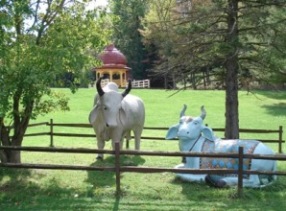
Welcome to Brijabasi Spirit
Thank you for taking the time to visit the New Vrindaban community blog. Think of visiting our blog as making a virtual pilgrimage.
Hare Krishna Hare KrishnaKrishna Krishna Hare Hare
Hare Rama Hare Rama
Rama Rama Hare Hare
"May cows stay in front of me; may cows stay behind me; may cows stay on both sides of me. May I always reside in the midst of cows."
Hari Bhakti-vilas 16.252
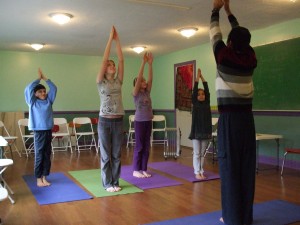
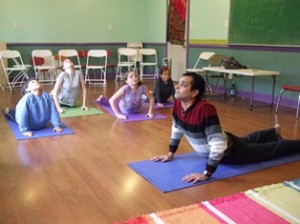
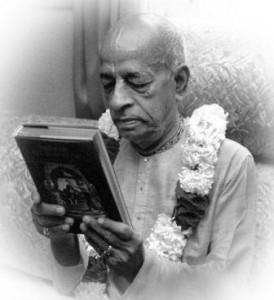
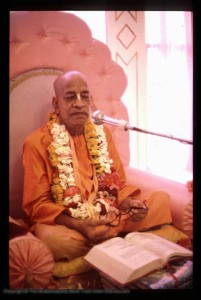
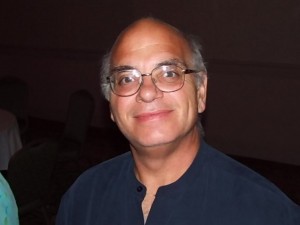
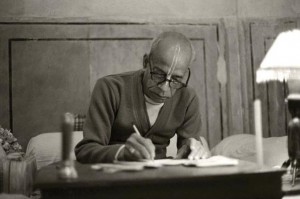





Recent Comments